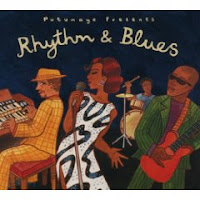Singer-guitarist Lionel Loueke’s newest project is an exotic and interesting blend of jazz and the native music of West Africa, produced with a ro
 tation of guest artists from both overlapping genres. They include, on two tracks apiece, fellow Benin native Angelique Kidjo (on “Ami O” and “Vi Ma Yon”), bassist-singer Richard Bona (a Cameroon native) on “Wishes” and Hide Life,” and bassist-singer Esperanza Spalding on the enchanting “Twins” and “Flying.” Interspersed with the duo pieces, three trio tracks combine the talents of Loueke with bassist Massimo Biolcati and drummer Ferenc Nemeth. My favorites are the interplay of Bona and Loueke on the closing track, “Hide Life” and Loueke’s intimate guitar and drums (Marcus Gilmore) reworking of Wayne Shorter’s “Nefertiti.” As the tune moves along, Loueke boils it down gradually to its melodic essence - eventually settling on the impact of three key notes. The CD title, Mwaliko, means “invitation” in Swahili. It is most fitting for thus essentially duo project with talented good friends.
tation of guest artists from both overlapping genres. They include, on two tracks apiece, fellow Benin native Angelique Kidjo (on “Ami O” and “Vi Ma Yon”), bassist-singer Richard Bona (a Cameroon native) on “Wishes” and Hide Life,” and bassist-singer Esperanza Spalding on the enchanting “Twins” and “Flying.” Interspersed with the duo pieces, three trio tracks combine the talents of Loueke with bassist Massimo Biolcati and drummer Ferenc Nemeth. My favorites are the interplay of Bona and Loueke on the closing track, “Hide Life” and Loueke’s intimate guitar and drums (Marcus Gilmore) reworking of Wayne Shorter’s “Nefertiti.” As the tune moves along, Loueke boils it down gradually to its melodic essence - eventually settling on the impact of three key notes. The CD title, Mwaliko, means “invitation” in Swahili. It is most fitting for thus essentially duo project with talented good friends.Carl Fischer & Organic Groove Ensemble, Adverse Times (Fischmusic)
Don’t pigeonhole this CD. Just enjoy it. Carl Fischer’s CD is likely to find a comfortable home on mainstream jazz and instrumental pop
 charts because of the leader’s pedigree. He toured early in his career with Maynard Ferguson and leads his own Organic Groove Ensemble from his Long Island NY home base when not touring with Billy Joel or subbing in Broadway pit bands. Fischer’s sound is strong and sure - without the constant high-octane, ear-cleansing notes of a Ferguson performance. He can hit it once in a while for impact, particularly on the title track. Other great treats here are the work of guitarist Jay Azzolina and the Hammond B3 work of Ron Oswanski. While the CD contains mostly Fischer originals, the covers here include Marcus Miller’s “Tutu” composition recorded by Miles Davis, and extended versions of Billy Joel’s “Downeaster Alexa” and “Elegy for the Fishermen.”
charts because of the leader’s pedigree. He toured early in his career with Maynard Ferguson and leads his own Organic Groove Ensemble from his Long Island NY home base when not touring with Billy Joel or subbing in Broadway pit bands. Fischer’s sound is strong and sure - without the constant high-octane, ear-cleansing notes of a Ferguson performance. He can hit it once in a while for impact, particularly on the title track. Other great treats here are the work of guitarist Jay Azzolina and the Hammond B3 work of Ron Oswanski. While the CD contains mostly Fischer originals, the covers here include Marcus Miller’s “Tutu” composition recorded by Miles Davis, and extended versions of Billy Joel’s “Downeaster Alexa” and “Elegy for the Fishermen.”Various Artists, Putumayo Presents Rhythm & Blues (Putumayo World Music)
Since 1993, Putumayo World Music has been specializing in compilation discs featuring music from specific countries, regions or styles. Its n
 ewest in the series, Rhythm & Blues, is terrific because it blends classic tunes and artists with some of the contemporary singers and players touching on the R&B genre. Examples: Lavelle White’s version of “I’ve Never Found a Man to Love,” James Hunter’s original “’Til Your Fool Comes Home,” Sam Moore, Keb’ Mo’ and Angie Stone’s rollicking remake of “Wang Dang Doodle,” Catherine Russell’s take on Sam Cooke’s “Put Me Down Easy” and Irma Thomas’s collaboration with pianist Henry Butler on John Fogerty’s “River is Waiting.” There are a dozen such gems.
ewest in the series, Rhythm & Blues, is terrific because it blends classic tunes and artists with some of the contemporary singers and players touching on the R&B genre. Examples: Lavelle White’s version of “I’ve Never Found a Man to Love,” James Hunter’s original “’Til Your Fool Comes Home,” Sam Moore, Keb’ Mo’ and Angie Stone’s rollicking remake of “Wang Dang Doodle,” Catherine Russell’s take on Sam Cooke’s “Put Me Down Easy” and Irma Thomas’s collaboration with pianist Henry Butler on John Fogerty’s “River is Waiting.” There are a dozen such gems.








